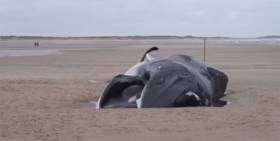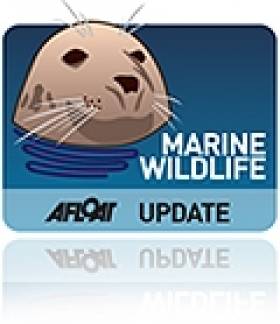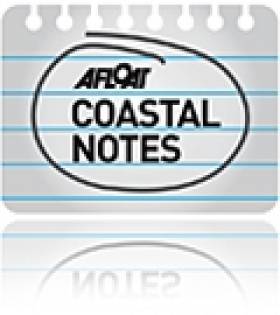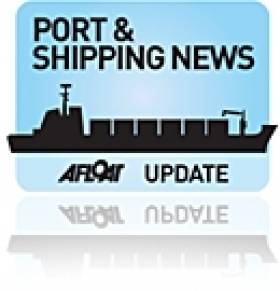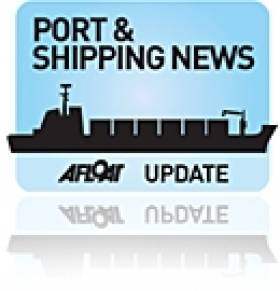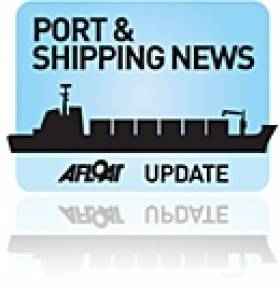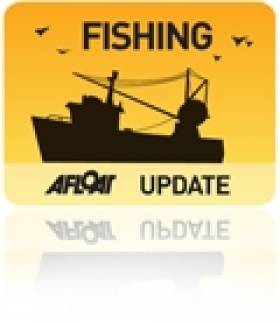Displaying items by tag: North Sea
Lecture: “North Sea Odyssey-3,607nm in a Shipman 28"
#lectures - ‘North Sea Odyssey –3,600nm in a Shipman 28’ by Christine Heath is the title of the next Friends of Glenua presentation to be held in Dublin in aid of the RNLI.
The Presentation on Thursday 4 April at 8pm will be held in the Poolbeg Yacht and Boat Club, Pigeon House Rd, Ringsend, Dublin 4. There will be an entry contribution of €5 in aid of the RNLI.
Lecture Background: Setting off from Dun Laoghaire in 2016 in Gusto, her Shipman 28, Christine Heathand friends sailed via the English Channel to Friesland in the Netherlands. They continued in 2017 to Oxelosund in Sweden. From there they crossed Sweden via the Gota Canal, then to Norway and finally to Inverness.
Her North Sea Odyssey is the latest chapter in a long and adventurous cruising life,extending to Iceland and beyond the Arctic Circle to the ice-strewn waters of Spitsbergen and Novaya Zemlya. She has been involved in sail training since she was 15 (in Coiste an Asgard) and later with Glenans. Hence her support for the Watersports Inclusion Games which will be held in Kinsale, 24 and 25 August.
This will be a FREE event celebrating sailing, rowing and canoeing for people of all abilities from the physical, sensory,intellectual and learning ability/disability spectrums. Johanne Murphy, Irish Sailing Watersports Inclusion Games Officer, will provide further details before Christine’s presentation.
Mystery Of Fin Whale Beaching On UK’s North Sea Coast
#MarineWildlife - Marine scientists have been puzzled by the recent beaching of a whale rarely seen off the east coast of England.
According to the Guardian, the carcass of a 12m fin whale washed up at Holkham in Norfolk last Thursday afternoon (20 October), far from its usual waters between Britain and Ireland.
“You never get them in the North Sea, so what it was doing there, we have no idea at the moment,” biologist Dr Ben Garrod told the newspaper.
It’s not yet known what causes the marine giant’s death, though collision with a vessel in the North Sea has been mooted as one possibility, as the Eastern Daily Press reports.
Three Bodies Recovered in Shetlands Helicopter Crash
#RNLI - Three bodies have been recovered from the water after a helicopter with 18 people on board crashed in the North Sea last night (Friday 23 August).
RNLI lifeboats from Aith and Lerwick in the Shetland Isles have spent the night involved in a multi-agency rescue operation, following reports that a helicopter had ditched into the sea west of Sumburgh airport.
It's believed the helicopter, a Super Puma L2, was carrying 16 passengers and two crew from the Borgsten Dolphin oil platform in the North Sea.
Both volunteer lifeboat crews made their way to the scene throughout the evening and assisted in the search for passengers with other agencies, including two coastguard rescue helicopters, a passenger ferry and a cargo vessel.
Fourteen people were rescued while the lifeboats were still making their way to the scene.
But early this morning Police Scotland conformed that three bodies had been recovered, two of which were recovered by Lerwick RNLI lifeboat and taken to a nearby pier. Work is now underway to recover the fourth individual.
A spokesperson for the RNLI said: "Sadly the bodies of three people have been recovered in the aftermath of yesterday’s crash, and we know that agencies are working to recover the body of the fourth person.
"We can confirm that the RNLI lifeboat crew from Lerwick lifeboat station recovered two of those people. The lifeboat crew transported them to Sumburgh and we are liaising with other authorities as things develop.
"Obviously this is the news that everyone, included our lifeboat volunteers, dreaded – our thoughts and prayers are with the families and loved ones of those four people. We can also confirm that one of our lifeboats has also been involved in reclaiming wreckage from the scene as part of the operation."
The wreckage of the helicopter is in a fairly inaccessible position near cliffs, and weather conditions at the time were described as not particularly good.
Lerwick RNLI lifeboat managed to tow the wreckage off rocks and it was being held in the shelter of a bay until a recovery operation could commence.
Killer Whale Pair Spotted Near Kinsale
#MARINE WILDLIFE - Two killer whales have been spotted near Kinsale in recent weeks, the Irish Whale and Dolphin Group (IWDG) reports.
Two separate sightings of the orca pair near Barry's Head have been confirmed by the group, via photos provided by John Murphy and Richard Cussen on 5 March, during what is normally the 'low season' for whale watching in Ireland.
The pair comprises one adult male and a smaller whale which is likely an adult female. It is not yet known, however, whether the whales are new to Irish or Scottish waters.
According to the IWDG's Pádraig Whooley, it is "interesting that they have stayed close to their original position and suggests they may have found 'rich pickings'".
In other news, the Whale and Dolphin Roadshow will be at the Galway Shopping Centre from 22-25 March in time for the European Cetacean Society Conference.
The roadshow "is a fantastic opportunity to learn more about whales, dolphins and porpoise of the ASCOBANS region" that encompasses the Baltic Sea, Northeast Atlantic and Irish and North Seas.
Make or Break Time for Fish Discards Ban
#FISHING - The Guardian reports that an alliance of EU member states plans to "hijack" a council meeting of the union's fisheries ministers today to prevent a ban on fish discards.
EU maritime affairs commissioner Maria Damanaki has stated her commitment to ending the practice, describing it as “unethical, a waste of natural resources and a waste of fishermen’s effort.”
Half of all fish in the North Sea - and up to two-thirds in other areas - are thrown back under the quota system implemented under the EU's common fisheries policy. The practice was recently highlighted by TV chef Hugh Fearnley-Whittingstall's 'Fish Fight' campaign.
Minister for the Marine Simon Coveney has called on EU states to support Ireland's effort to deal with fish discards, as previously reported on Afloat.ie.
But some member states, led by France and Spain, have dismissed the proposed ban as "unrealistic" and "too prescriptive", and will attempt to pass a declaration to allow the practice to continue indefinitely.
According to the Guardian, the charge is being led by industrial-scale fishing enterprises who want to retain the permission to discard lower value fish in order to maximise profits.
Brussels insiders say that if the declaration were to pass it would "kill the reform".
Oil Strike Success Off Cork Coast Could Be Worth Billions
#COASTAL NOTES - Providence Resources has struck big off the south coast of Cork with an oil flow that could be worth billions of euro to the beleaguered Irish economy.
According to the Guardian, the Dublin-based company announced yesterday that oil had started to flow successfully from its Barryroe structure in the north Celtic Sea at nearly twice the rate previously projected.
Providence Resources CEO Tony O'Reilly Jr said the discovery was a "seminal day for Ireland, especially in the runup to St Patrick's Day."
Last month the firm had confirmed the presence of light oil with its first appraisal well at the site, a situation described by its technical director as "extremely encouraging".
Now that a steady flow has been achieved, future extraction from the oil field - comparable to a medium-to-large North Sea field - can surely proceed, which now puts pressure on the Government to grand permission for further exploration around the Irish coast.
As previously reported on Afloat.ie, plans by Providence Rescources to prospect for oil on the east coast off Dalkey Island have been met with fierce opposition by mainland residents and environmental groups.
The Guardian has much more on the story HERE.
Ship-to-Ship Transfer of OIl Cargo Delayed Yet Again
#SHIPPING - The transfer of hazardous cargo from the stricken tanker at the entrance to Belfast Lough has been delayed yet again due to winds nearing hurricane strength.
The Belfast Telegraph reports that the Genmar Conpanion - which was redirected to Belfast after reporting a cracked hull en route from Rotterdam to New York - will remain sheltering off the Copeland Islands until the weather improves.
As previously reported on Afloat.ie, the ship-to-ship transfer of 54,000 tonnes of vacuum gas oil was originally scheduled to take place on 31 December last, but the task was pushed back as the receiving ship, BW Seine, was delayed by weather in the North Sea.
It had then been hoped to begin the transfer early yesterday with the receiving ship's arrival, but the strong storm-force winds that have increasingly battered Ireland in the last 36 hours put paid to those plans.
Ship-to-ship transfers can take place in wind speeds of up to 35 knots, but yesterday the wind speed in Belfast Lough was reported as more than double that.
Hugh Shaw, the NI Secretary of State's representative for maritime salvage and intervention, told the Belfast Telegraph: "As soon as we have a window to do the ship-to-ship transfer safely we will take it.
"Winds have been dropping a bit, but it looks unlikely the operation will take place on Wednesday."
Transfer of Cargo from Stricken Tanker Delayed
#SHIPPING - The transfer of cargo from the damaged oil tanker sheltering at the entrance to Belfast Lough has been posponed for at least two more days.
As previously reported on Afloat.ie, the 228-metre Germar Companion - which is carrying 54,000 tonnes of vacuum gas oil - was redirected to Belfast after reporting a cracked hull en route from Rotterdam to New York.
The merchant vessel has been sheltering off the Copeland Islands since 16 December, where an official examination recommended removal of the cargo.
Today (31 December 2011) had been the scheduled start date for the move of the tanker's hazardous cargo by ship-to-ship tranfer. But the move has been delayed as the second ship, the BW Seine, is still en route to Belfast Lough.
"It is currently in the North Sea and could take another two days before it reaches the vessel and starts to transfer the cargo," a coastguard spokesperson told the Belfast Telegraph.
The transfer will be managed by specialist company Fendercare Marine in the lough, and could take between 24 and 36 hours. Once finished, the Germar Companion will sail into Belfast for repairs.
On board the 60m vessel there is an aft clear working deck space used for supplies which is capable of handling two 20ft reefer containers and a single 20ft storage container. The vessels' powerplant is provided by 2 x Caterpillar 3516B main-engines of 1920kW (5150bhp) at 1500 rpm which drive twin kort nozzles propellers and equipped with a corresponding pair of high-lift rudders.
Accommodation is for 42 berths (11 for officers and crew) and other marine personnel (numbering 31) in addition to two hospital berths. All of the cabins are air-conditioned with washrooms/WC.
Dina Alliance brings the Mainport Group fleet total to 24 vessels (for list click HERE) which are deployed in various sectors engaged in offshore support vessels covering safety standby, tugs, tanker assist, towage, bunkering and seismic support services.
Earlier this year the company's Foynes based tug Celtic Isle was requested to assist in refloating the stricken combi-heavy lift vessel Pantanel which had dragged its anchor in stormy seas after running aground in Cashla Bay, Rossaveal. The German-owned vessel was to load two former Aran Direct owned fast-ferries that operated from the Connemara harbour on a delivery voyage bound for Mauritius.
Mainport is a Cork based operation with offices located in Foynes, Limerick, Drogheda in addition to operations overseas in Durban and Johannesburg in South Africa and Aktau in Kazakhstan.
- Celtic Tugs
- Ports and Shipping News
- Aran Islands
- Aran Direct
- Rossaveal
- Island News
- North Sea
- Mauritius
- Mainport Group
- Cashla Bay
- Celtic Isle
- Dian Alliance
- Anchor handling tug supply
- AHTS
- Aran Islands fast ferries
- Pantanel
- Combicarrier Pantanel
- Mauritus
- shipgrounding Cashla Bay
- Supply Seismic Support Vessel
- North Sea energy reserves
- Dina Alliance
Significant EU Fishing Reforms On The Way
Fishing boats will have to land their entire catch - whether or not the fish are in a saleable condition - according to new European Union proposals.
The Guardian reports that EU fisheries commissioner Maria Damanaki has pledged to bring and end to the "nightmare of discards" in response to the high-profile campaign against the practice of fishermen dumping dead fish from their catch.
Half of all fish in the North Sea - and up to two-thirds in other areas - are thrown back under the quota system implemented under the EU's common fisheries policy.
Damanaki said that her proposed reforms to the system would be phased in over a number of years pending approval by the European parliament.
She acknowledged the concerns of fishermen, who fear the value of their catch will plummet if they are not allowed the choice of which fish to keep, but said they would benefit in the long term as ending discards would help to protect stocks of commercial fish.
Meanwhile, Irish conservation groups have joined a worldwide campaign to put the environment at the heart of the EU's fishing reforms.
The Irish Times reports that Birdwatch Ireland, Coastwatch Europe, the Irish Wildlife Trust and Irish Seal Sanctuary have all signed up to the Ocean 2012 initiative, which hopes to work with the fishing industry to find a balance that preserves both the ecosystem and fishermen's livelihoods.

